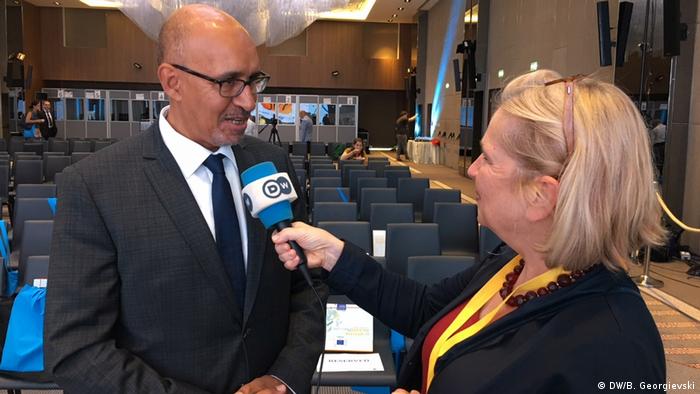The development of independent media in the countries of the Western Balkans continues to be a Central task of the media policy of the OSCE in this Region, says Harlem Desir.

DW: The media in the countries of the Western Balkans pressure, much of it is in relation to the freedom of expression and freedom of the press is in a sorry state are under a lot of. What are the reasons in your estimation?
Harlem Desir: The biggest Problem of the media in the Western Balkans, the (risk of) security of journalists. We have seen in the past, many of attacks and threats. There is still too much impunity for the perpetrators and too little law enforcement. For example, it was recently shot in Montenegro, the journalist Olivera Lakic. And the attackers are still at large. Something like that creates a climate of threat, and even self-censorship.
It is also a question of respect, both from policy makers. The press must be respected, even if it is critical. The press is by its nature critical. It is an important actor in the democracy, as she calls those who are in Power to account. And it helps the Public to independent Information, and therefore allows for a pluralistic debate. It is, therefore, a very important task to allow the media pluralism and diversity. In many countries media are under very strong economic pressure and under the pressure of political interests that use the media to shape public opinion, whether for or against the government.
It is very important to allow the development of independent media, which are powered by professional journalism. We want to promote quality journalism and plurality of Opinion. And for that, we need fair rules, the rule of law, and of course the respect for freedom of expression. And, of course, should also be avoided to be influenced by the politically-driven advertisement media, buy media, to buy journalists and pressure on Newspapers to represent a different opinion.
The editorial recommends
The staged threat of the Serbian President
The Serbian ruler Aleksandar Vučić has almost all the media in the country on a short leash. The propaganda machine maintains a special feature: periodic reports about allegedly planned terrorist attacks. (27.07.2018)
Journalists as enemies of the state in the Western Balkans
Human Rights Watch denounces the numerous attacks on independent media in the countries of the Western Balkans. In a report to the governments of the countries should be criticized, but the European Union is also sharp. (02.12.2016)
Croatia: death threats against journalists
“Reporters without borders” criticized Croatia: The situation of press freedom have deteriorated massively. In the most recent EU member country, many journalists are threatened. Two victims tell how they handle it. (27.12.2017)
In the light of this analysis What do you do as a OSCE media representative?
I intervened last year, more than 40 times in governments of the Western Balkan countries. All these countries are members of OSCE, and they have committed themselves to respect the freedom of press and speech. So they gave me a mandate as the representative on freedom of the media, to complain publicly or through diplomatic channels with them whenever there is a threat against a journalist or against the working conditions of journalists, or against the diversity and pluralism of the media. So we work with them.
I’ve given several recommendations to the governments in terms of new reforms, and in respect of draft legislation. We are committed to ensuring that, for example, the financing of the public broadcaster is sustainable and independent of the editorial policy. It is a very difficult process that, I fear, will take a long time. But I think he has a great urgency. Because these countries are now in a process of EU-approximation. And it is clear that there can be no democratization when there is no free, independent and pluralistic media in the countries.
After a year in office – How do you see the development of the freedom of the media in the Western Balkans? The tendency towards improvement or deterioration?
It is different from country to country. I can say that we have seen in Macedonia in the last year a lot of changes. The climate for the media is quite different, and also the legislation for the media is better. But what we in the Region also see that there are still many threats of journalists. There is still a gap between the legislation, which is in most cases well, and their implementation, which does not reflect a real respect for the pluralism and independence of the media.
I’m under great economic pressure on the media, as anywhere in the world. But it is even more difficult in this Region, because the markets are smaller. I think there is a need to support the digitalization and adaptation. So we can guarantee that in the future a vibrant and pluralistic media landscape with high quality journalism. And that is why we support the regulation of the media, the establishment of press councils, and the respect for the labour rights for journalists to have strong journalists in the media who are in the position to make themselves free of political pressure.
Harlem désir is a French politician from the Parti socialiste and Secretary of state for European Affairs in the French Ministry of foreign Affairs, and since 2017 the OSCE representative on freedom of the media.
The interview was conducted by Adelheid Feilcke